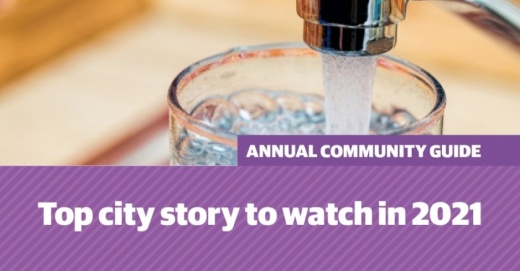Pearland resident Jimmy Davis has been involved with the water billing backlog since January 2020, when he noticed his water bill was for usage from before Thanksgiving. Davis said there are still residents with issues in billing or meter reading that have not been addressed.
“To the residents, nothing changes, and then they get a water bill that is 300% or 400% higher,” he said.
In February 2020, city staff presented to council a 60-day gap between reading water meters and sending out bills, causing the city to fall behind in collecting $6 million in payments at the time. Some citizens have since asked for more transparency from the city due to the incident. As of November, the city's arrearage in billing is $7.8 million, according to city staff.
More clarity will be provided with water billing once the city’s Advanced Meter Infrastructure system is up and running, Pearland Director of Engineering Robert Upton said.
“If there is a customer that has a concern, they need to call utility billing,” Upton said. “That’s important to us.”
The city has finished installing new water meters but still has to do drive-by readings until the AMI is operational, which is expected to happen between April and June. The AMI includes a customer portal, which allows customers to see water usage in real time.
Davis said he wants to see the city get caught up in billing and to file for insurance to cover the cost of the money that has yet to be collected as well as a chartered citizen group.
Newly elected Mayor Kevin Cole proposed council create an ad hoc citizen committee at the council’s December meeting. This committee would provide input on the city’s utility billing process, according to agenda documents, but it would also be a short-term solution.
Council brought forth a committee of eight citizens to work alongside city staff, council members, Cole and consulting company Raftelis Consulting Group to provide input on the utility billing process at the Jan. 11 meeting.
“To get a committee and have the buy-in from the city will do two things: It will help us understand where we are at and [help us] get some information out there,” Council Member Woody Owens said at council’s Dec. 14 meeting.
Since the incident, the city has hired new utility billing management, hired Raftelis to complete a formal review of the system and implemented the 32/30 plan to collect the money that has yet to be billed. The 32/30 plan is a billing plan to catch up the city with the money it needs to collect, approved in spring 2020. The city expects to be financially caught up by early 2023. The ad hoc committee will also look at the 32/30 plan.
Both council and Cole expressed a desire for the group to be put together quickly so it could work alongside Raftelis, which will submit its final report on the utility billing process and system review at the Jan. 25 council meeting, according to agenda documents.





